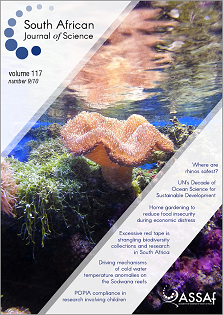Brain circuity: The case of South Africa as a hub for doctoral education
DOI:
https://doi.org/10.17159/sajs.2021/10674Keywords:
mobility, migration, doctoral studies, higher education, AfricaAbstract
The production and reproduction of knowledge are important components of national development. As student mobility increases, globally and within Africa, so does the national diversity of students as they seek to further their postgraduate studies at the limited number of research universities in Africa. Knowledge migration is inevitably a relationship between nation states because migration is driven by push factors (such as the socio-economic conditions and opportunities) in the country of origin as well as by pull factors (such as the rules and incentives for entry, participation in postgraduate education and post-study residency), which are prerogatives of the host nation. In other words, migration and development must be understood in comparative terms. The brain drain perspective on migration and development takes mainly the perspective of the origin country into consideration. Migration and the loss of high-level skills are seen as detrimental to the development prospects of the country of origin. The brain circulation perspective moves the discussion forward by suggesting that there are residual returns to the country of origin. However, relatively little attention has been given to the impact of knowledge migrants on the host nation when the host is facing its own post-colonial development challenges. This is the dilemma facing South Africa as a hub for doctoral students from the rest of Africa: attracting top doctoral students from the rest of the continent to contribute to the country’s knowledge capacity but at the expense of developing local talent, thereby setting up a complex tension between underdevelopment and development. Here we establish whether South Africa is maintaining its position as a PhD hub on the African continent and explore the extent to which the brain circulation argument holds up in the African context. We suggest that, given the current policy environment in South Africa, brain circuity is a more likely outcome, where brain circuity describes the flow of knowledge characterised by indirection and undesirable intricacy.
Significance:
- In the case of South Africa as a destination for doctoral students from the rest of Africa, neither the brain drain nor the brain circulation theories of student mobility hold; rather, students are confronted with an overly complex set of conditions resulting in brain circuity.
- Despite the continued attractiveness of South Africa as a destination for doctoral students, the tension between equity and development remains unresolved at the policy level, potentially undermining the circulation of knowledge for the benefit of all African countries.
Published
Versions
- 2021-10-21 (2)
- 2021-09-29 (1)
Issue
Section
License

This work is licensed under a Creative Commons Attribution 4.0 International License.

All articles are published under a Creative Commons Attribution 4.0 International Licence
Copyright is retained by the authors. Readers are welcome to reproduce, share and adapt the content without permission provided the source is attributed.
Disclaimer: The publisher and editors accept no responsibility for statements made by the authors
How to Cite
- Abstract 2960
- PDF 730
- EPUB 169
- XML 213
Funding data
-
National Research Foundation
Grant numbers 91488












.png)